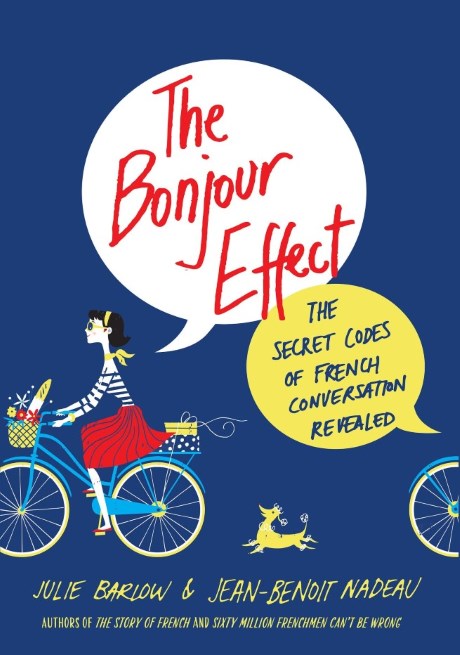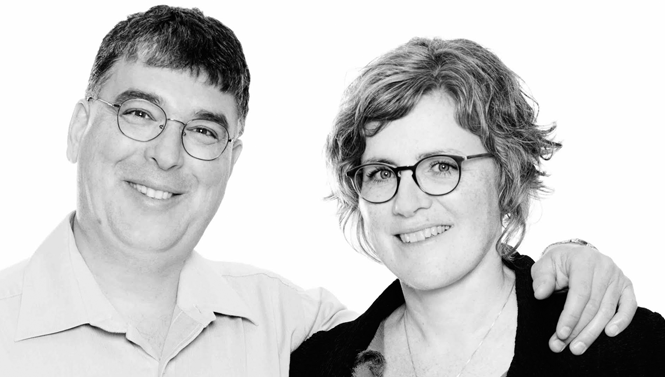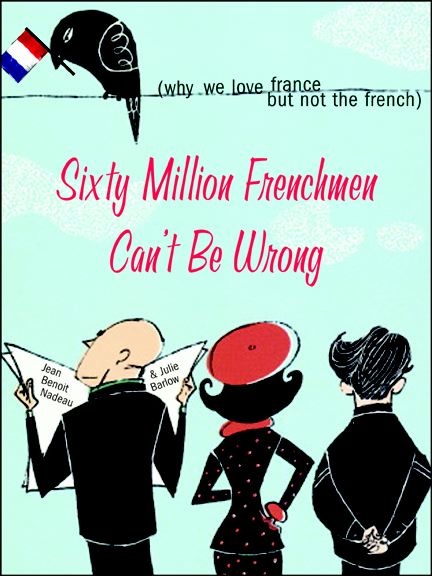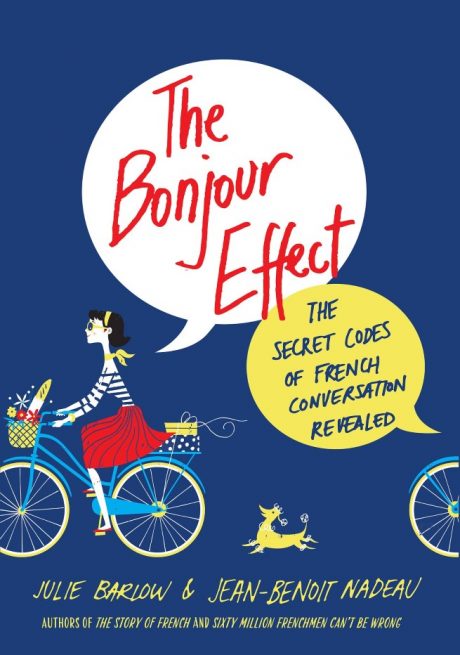The Bonjour Effect: An Interview with Authors Julie Barlow and Jean-Benoît Nadeau
- SUBSCRIBE
- ALREADY SUBSCRIBED?
BECOME A BONJOUR PARIS MEMBER
Gain full access to our collection of over 5,000 articles and bring the City of Light into your life. Just 60 USD per year.
Find out why you should become a member here.
Sign in
Fill in your credentials below.

Julie Barlow and Jean-Benoit Nadeau are the award-winning authors of the international bestseller Sixty Million Frenchmen Can’t Be Wrong, as well as of The Story of French, The Story of Spanish and seven other books, as well as hundreds of articles. Barlow grew up in Ontario, and Nadeau in Quebec: they met as students at McGill University in Montreal. After graduating, they worked as freelance journalists, publishing widely in national Canadian magazines.
Avid travellers, Barlow and Nadeau have lived in Paris, where Nadeau was a fellow of the Washington-based Institute for Current World Affairs; Toronto; and Phoenix, Arizona, where Barlow was a Fulbright Scholar at Arizona State University. They are regular contributors to Canada’s national public affairs magazine L’actuality, and they write for a wide variety of other publications as well.
Trilingual in English, French and Spanish, the couple is based in Montreal, where they live with their twin daughters. They recently took the time to answer Janet Hulstrand’s questions about their latest book, The Bonjour Effect: The Secret Codes of French Conversation Revealed, in this interview for Bonjour Paris.
Janet Hulstrand: Why did you decide to write this book? How did the idea for it come about, and what was the main thing you wanted to offer your audience, in terms of better understanding the French?
Julie Barlow: It’s sort of a funny answer. We got the idea for The Bonjour Effect literally walking to our editor’s office in New York City. We really wanted to return to France, where we had lived from 1999-2001 to write our first book, Sixty Million Frenchmen Can’t Be Wrong, partly because we wanted to give our daughters, who were 10 at the time, the opportunity to live in France. It occurred to us that a book project might be the way to do that. So we tried to think about what kind of questions were still nagging us about the French. The truth is, even after the years we lived in France and the many subsequent trips and interactions we’ve had with French friends, we still had some trouble communicating. We knew that travelers who love France often come home feeling miffed by the French. And we thought people would find it useful to have a book explaining how to communicate effectively with the French. We suspected that French education had something to do with the misunderstandings, and indeed, having children in French school gave us the chance to explore that. Our editor loved the idea, so off we went, and the result is The Bonjour Effect.
Janet: You stress several times in your book the importance of saying “Bonjour,” even in many contexts where Anglophones couldn’t imagine it would be necessary. For example you advise your readers to “Say bonjour like you mean it and say it a lot. If it feels like you’re saying it too much, that’s just enough.” But there is one awkward situation in which you’re really not supposed to say it, right? And that is when you see—or pass by—the same person to whom you’ve already wished a “bonjour” a short time earlier in the same day. What are you supposed to say then?
Julie: To be honest, as freelance writers working out of our apartment in Paris, we didn’t meet a lot of people more than once a day! But as a general rule, if you have already said bonjour to someone, you can skip it the second time you meet them. Just don’t ignore the other golden rules of communicating with the French that we explore in our book. Say something interesting, even if it’s provocative. Don’t start a conversation by asking someone their name or what they do for a living– the French consider those things private. We have a list of such “Do’s” and “Don’t’s” at the end of our book.
Janet: Could you explain the concept of a phatic? And are phatics more common, or more important in France than in English-speaking countries? Or are they just different?
Julie: Phatics are words people use to send a social signal rather than to communicate information. So bonjour isn’t really a word. It’s a way of saying you want to converse or interact with someone. You are asking permission, in a way, to talk to someone, or ask a service from them. In France, for instance, you say bonjour to let someone know you are entering his or her “territory.” In The Bonjour Effect we tell the disastrous story of getting on a city bus and forgetting to say bonjour to the driver. What a mistake!

© Nadeau & Barlow
We have phatics in English too. We say, “how are you” as a greeting, as a sign of goodwill, not because we really want to know the answer. I’m sure every culture and language has its own phatics. The trick is understanding and using them properly, which is why we have an entire chapter just on bonjour!
Janet: One of the most helpful/useful things you pointed out, at least for me, is that in France, “non” does not necessarily mean no. You point out that when a French person says “non” they are really just providing the opening for a negotiation. Any tips about how Anglophones can remember this, and use it to their advantage?
Julie: Anglophones are easily put off by the rather automatic French non because we interpret it as a rejection. We think it’s the end of the conversation. It almost never is in France. The best way to deal with the non is, like you said, to consider the beginning of a negotiation process. In The Bonjour Effect we tell the story of how I tried to get a metro pass, for example, without having the proper identification papers to prove I was a resident of Paris. The metro agent’s initial answer was a flat non. The key in these situations is to keep talking – and that’s what I did. I just dropped French terminology and other details about my neighborhood in Paris until the metro agent believed me, and then she gave me the pass. It seems like you have to go through a lot of work to get something in France, but once you get in the habit of it, this kind of communication can be really fun. The metro agent and I ended up having quite an interesting conversation.
Janet: What do you think is the hardest thing for Anglophones, especially North Americans, to understand about the French? Perhaps another way of saying this is, what is the thing that causes significant misunderstandings between North Americans and the French the most often or the most easily?
Julie: The hardest thing for foreigners to get used to in France is their love of confrontation. For the French, conflicting viewpoints are normal, even desirable in conversation. This is so hard for Anglophones to understand and to accept. Anglophones tend to value consensus and shy away from confrontation, especially with people we don’t know, for fear of offending them. For the French, conversation is not about sharing experiences. It’s about sharing viewpoints – so disagreeing is normal! The French think conversation should be interesting, and if that means they run the risk of saying something offensive, then they’re okay with that. It’s better to offend than to be boring! Conversation is like a sport in France. Once you understand this, it’s so liberating. But it really runs against our cultural grain.
Janet: What is one of the most interesting things you learned in the course of writing this book? And is there any one aspect of the French character that you find almost impossible to understand, no matter how hard you try?
Julie: The most interesting discovery we made was in how the French education system “trains” children to communicate. Language and language skills are so important to the French. For the French, public speaking is not an optional skill. The French consider it a basic life skill. Our daughters were a little shy in their first days in school, which was normal, but their teachers were quite alarmed, fearing the girls didn’t know how to express themselves properly.
As to the second question, neither of us fully understands why the French are so afraid of being blamed. We write about this fear of la faute in The Bonjour Effect. For some reason, the French just refuse to say, “I don’t know.” Instead, they typically fend off blame (for not knowing something) by pretending it doesn’t exist, or isn’t available, or is just impossible. It’s a cultural tic, partly related to the way the French are raised and taught, we discovered. For Anglophones, it’s hard to get used to. The key, once again, is just to keep talking!

Sixteen Million Frenchmen Can’t Be Wrong by the same authors
Janet: You were finishing your book in 2015 and it was published in 2016. I found your insight into the French political scene very interesting and quite prescient given the election season the French have just gone through. What are your thoughts about the new French president? Do you think he will be able to get the various factions working together? Is there hope for a more united France, and for a France that can deal more effectively with some of the entrenched problems that have been plaguing them, and have not been dealt with very effectively?
Julie: Our take on the new president, Emmanuel Macron, is that he was successful mostly because he managed to break a certain number of taboos that have hampered French politics. Most importantly, he embraced an optimistic view of France. This was in sharp contrast to the view of his main opponent, the National Front’s presidential candidate Marine LePen. In the end, the French gave more credence to Macron’s optimistic outlook on the economy and on immigration than they did to the alarmist, doomsday predictions of LePen. Of course, dealing with the realities of French politics is different than winning an election. Promises have to be translated into action. One of the most ambitious things Macron is attempting to do is reform France’s labor code. Most experts agree that overregulation of the job market is one of the chief obstacles to job creation in France. If Macron manages to pull this off, it will be a great achievement. But it will be divisive. So in the meantime, his efforts won’t make him popular. Job security is such a contentious issue in France. Most French people think of job security as a fundamental right.
Janet: What do you like, or admire, most about the French? What drives you the most crazy?
Julie: What I love most about the French is how daring and free they are in conversation. You can say anything in France, as long as it’s interesting and you are prepared to argue your point. I tell the story in our book of a dinner party where I just decided to liven up the conversation by saying I thought art deco was fascist. They loved it! I find the French conversational style challenging, but fun, and ultimately liberating. When disagreements happen, the French don’t really take them personally the way English-speakers tend to. They use them to make more conversation.
What drives me crazy about the French is their inability to say anything good about their own country. The French have an ingrained culture of negativism that we discuss in The Bonjour Effect. Unfortunately, that shapes the way they talk about France. If you were to believe the French, everything is going downhill: their language, their culture, their economy – you name it. Of course things aren’t that bad. What saves the French is that they are always open to conflicting viewpoints and argument. So their negativism is always food for conversation.
Janet: What are you working on now? Is there another book in the works?
Julie: We have a number of projects in development. We’ll let you know when the contracts are signed!





REPLY